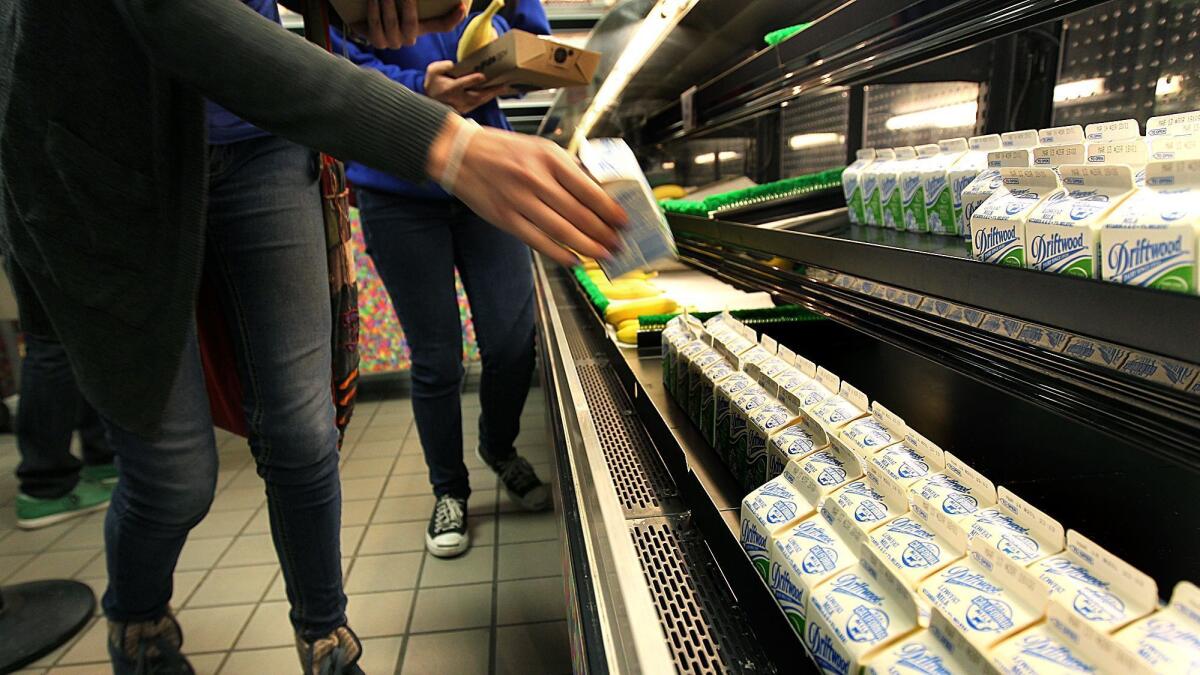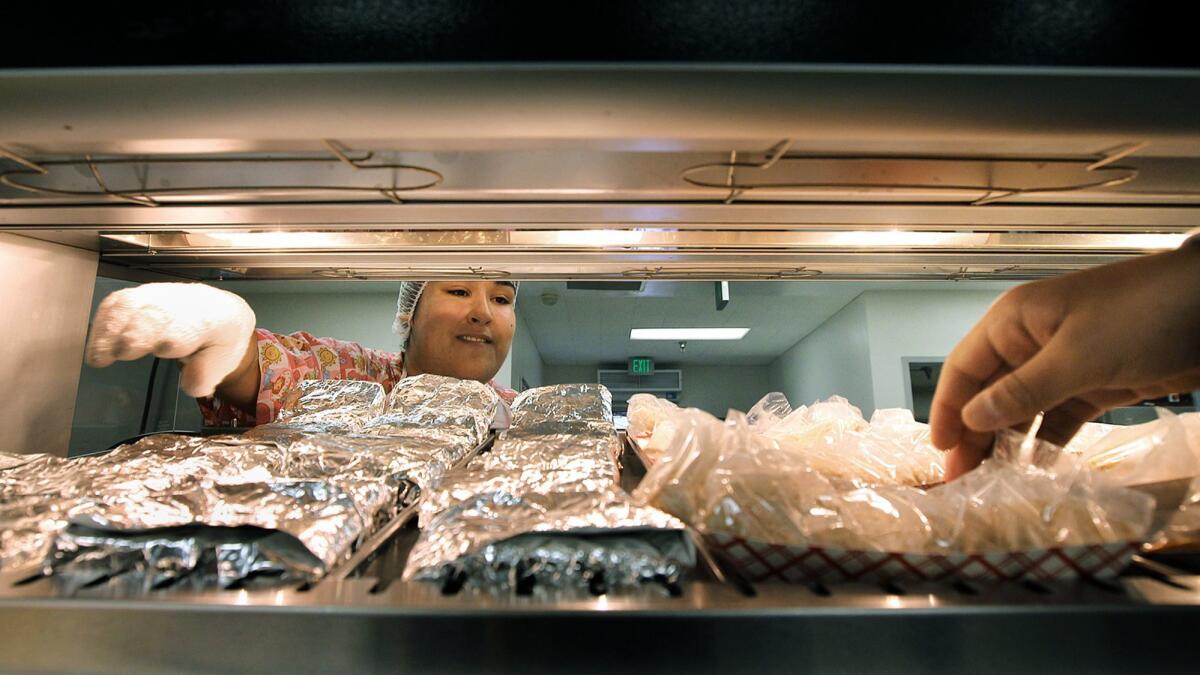L.A. Unified rushed to rebuild cafeterias, then fought for years to recoup excess costs

The Los Angeles Unified School District’s $37-million Cafe L.A. project at first seemed like a stunning success.
In 18 months, 64 school cafeterias were gutted and transformed so that students could be served faster — and with healthier options.
Then the district’s auditors looked at the books. They concluded the construction came at a high cost.
The three companies that had done the work had overcharged for equipment and services, charged for equipment that was never purchased and used less expensive materials than they had said they would, the auditors said.
The school district sued, launching nearly six years of litigation, which was not publicized by any of the parties involved.
District officials discussed the cases for the first time this month after the latest verdict, in which a Los Angeles Superior Court jury ordered Chicago-based F.H. Paschen to pay the district $855,000.
Overall, with that and other judgments, the district has won $5.04 million from F.H. Paschen, including interest. In separate cases, the district has won $5.03 million from Torres Construction, while MTM Construction paid it $900,000 in a settlement.
The three companies have denied wrongdoing, and some rulings and appeals still are pending. But the money recovered by L.A. Unified is approaching $11 million.
“The district sought and was awarded the difference between what it paid … and what it should have paid had the proposals been properly priced,” said David M. Huff, who was part of L.A. Unified’s legal team.
Going after the money was a high-risk move for the nation’s second-largest school system. The targeted contractors — and their insurers — had resources to dig in and fight back. They also had motivation, since adverse decisions could jeopardize future California public works contracts. Expensive, unsuccessful litigation would have been embarrassing for a school district already facing financial challenges serious enough to threaten its solvency.
The allegations against all the contractors were similar.
In a 2014 decision, L.A. Superior Court Judge Richard L. Fruin laid out ways in which F.H. Paschen overcharged.
At Burroughs Middle School, for example, the cafeteria needed two cashier stations and F. H. Paschen installed them, at more than $2,400 apiece. But the company, in its contract, charged for five units as well as four-tenths of another one.
At Birmingham High, it installed two cabinets to keep food warm — each costing more than $3,000 — but charged for four and part of another.
In its contract, for many items, the company was allowed a 5% profit. But it took a cut nearly five times that big. Through such practices, F.H. Paschen charged about $65,000 too much at Burroughs and Birmingham combined.
F.H. Paschen and the other companies also said they would use products — including electrical wiring — more expensive than the ones they installed, putting in “the Chevrolet” but charging for “the Cadillac,” said Huff of the L.A. Unified legal team.
“The district inspectors signed off because our plans showed a Chevrolet and the Chevrolet was delivered,” Huff said.
MTM, which is based in the City of Industry, admitted no fault in its settlement, and the other two companies still are fighting in court.
Lawyers for F.H. Paschen have argued, in part, that L.A. Unified managers not only approved their proposals but instructed the company to write them in the way that they did.
“At no point did F.H. Paschen overcharge the district for its work,” said the company’s attorney, Marion T. Hack.
Attorney Andrew Harris, who represents Los Angeles-based Torres Construction, said: “There was never any criticism of Torres during the time the work was being performed, either in terms of the pricing or the quality of work.”
The construction that led to the litigation came about when L.A. Unified set out to speedily solve one of its long-standing problems.
For decades, many school cafeterias hadn’t been able to meet demand efficiently. Students waited in long lunch lines and ended up without enough time to eat. Many were skipping lunch altogether.

The new cafeterias allowed for multiple lines in which students could grab prepackaged offerings from cabinets that kept food hot or cold. They were not set up for cooking; food was prepared in central kitchens and then trucked to campuses.
To get the cafeterias ready quickly — and to try to save money — the district used what is known as job-order contracting. It was a first for California school districts, though it is not uncommon for government projects.
To be eligible for the cafeteria work, contractors had to agree to follow a catalog that set prices and the allowable amount of profit.
In L.A. Unified the maximum for a single job was set at $1 million.
The project launched in March 2008. Construction began within six months and all 64 cafeterias were finished by September 2009.
When the project began, the three contractors already were getting a lot of work in a $20-billion districtwide effort, begun in 1997, to build, repair and modernize campuses. F.H. Paschen and Torres, a company founded in 2001, each won about $120 million in contracts for projects across the school system, according to L.A. Unified. The contracts for MTM totaled $22.3 million.

The Cafe L.A. project seemed likely to open the door to more opportunities for these companies, including subsequent cafeteria makeovers — until the audits by the district’s inspector general. Auditors examined numerous companies’ job-order contracts for cafeteria work as well as other projects.
“Some of the job orders were overpriced and unreasonably priced, but still approved,” auditors wrote in a 2011 report. Twelve of 17 sample projects exceeded proper costs by 77% on average, they concluded.
In response, district officials made significant changes to the contracting program and decided to sue the three companies over the Cafe L.A. work.
In his 2014 ruling for the district, Judge Fruin noted L.A. Unified’s shortcomings, writing that F.H. Paschen “has plenty of ammunition for its arguments.”
An L.A. Unified representative, the judge said, had instructed F.H. Paschen to prepare a proposal that would “mirror” one made by Torres. Staff at the Chicago company took that to mean they should charge the higher prices that Torres was charging, their attorneys said.
In his ruling, Fruin quoted a company attorney, who said, “We manipulated the contract…. We freely admit that. … That is exactly what we were instructed to do [by L.A. Unified] and we did it.”
District managers also signed off on the completed work, and the district’s lawyers have not challenged its quality.
But Fruin concluded that the school system still had the right to seek remedies after the audit findings.
The inspector general for L.A. Unified, which oversaw the audits, evaluated the possibility of collusion between the companies and wrongdoing or negligence by L.A. Unified employees. But these investigations were either inconclusive or dropped.
“By the time this was discovered, most if not all of the district employees and consultants involved had moved on,” said Mark Miller, an L.A. Unified attorney. “I believe there was a reduction in force and there was no one left to discipline.”
Huff, representing L.A. Unified, said that the district’s oversight process ultimately worked.
“Just because a district employee or consultant misses something,” he said, “that doesn’t mean that the contractor gets to get away with it.”
UPDATES:
4:30 p.m., Feb. 26: This article was updated to include more examples of the alleged overcharging.
This article was originally published on Feb. 22.











